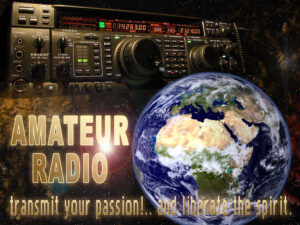Contesting
Contesting (also known as radiosport) is a competitive activity pursued by amateur radio operators. In a contest, an amateur radio station, which may be operated by an individual or a team, seeks to contact as many other amateur radio stations as possible in a given period of time and exchange information. Rules for each competition define the amateur radio bands, the mode of communication that may be used, and the kind of information that must be exchanged. The contacts made during the contest contribute to a score by which stations are ranked. Contest sponsors will then publish the results in magazines and on web sites.

Radio contests are principally sponsored by amateur radio societies, radio clubs, or radio enthusiast magazines. These organizations publish the rules for the event, collect the operational logs from all stations that operate in the event, cross-check the logs to generate a score for each station, and then publish the results in a magazine or on a web site. The competitions are normally between stations licensed in the Amateur Radio Service. Awards granted by the contest sponsors are typically limited to paper certificates, plaques, or trophies.
During a radio contest, each station attempts to establish two-way contact with other licensed amateur radio stations and exchange information specific to that contest. The information exchanged could include an R-S-T system signal report, a name, the national region, i.e. a province or the US state in which the station is located, the geographic zone in which the station is located, the Maidenhead grid locator in which the station is located, the age of the operator, or an incrementing serial number. For each contact, the radio operator must correctly receive the call sign of the other station, as well as the information in the “exchange”, and record this data, along with the time of the contact and the band or frequency that was used to make the contact, in a log.
A wide variety of amateur radio contests are sponsored every year. Contest sponsors have crafted competitive events that serve to promote a variety of interests and appeal to diverse audiences. Radio contests typically take place on weekends or local weeknight evenings, and can last from a few hours to forty-eight hours in duration. The rules of each contest will specify which stations are eligible for participation, the radio frequency bands on which they may operate, the communications modes they may employ, which other amateur radio stations they may contact, and the specific time period during which they may make contacts for the contest.
The scale of activity varies from contest to contest. The largest contests are the annual DX contests that allow worldwide participation. Many of these DX contests have been held annually for fifty years or more and have devoted followings. Newer contests, those that intentionally restrict participation based on geography, and those that are shorter in duration tend to have fewer participating stations and attract more specialized operators and teams. Over time, contests that fail to attract enough entrants will be abandoned by their sponsor, and new contests will be proposed and sponsored to meet the evolving interests of amateur radio operators.
For more information on contests go to https://www.contestcalendar.com/or visit a local Amateur Radio Club.